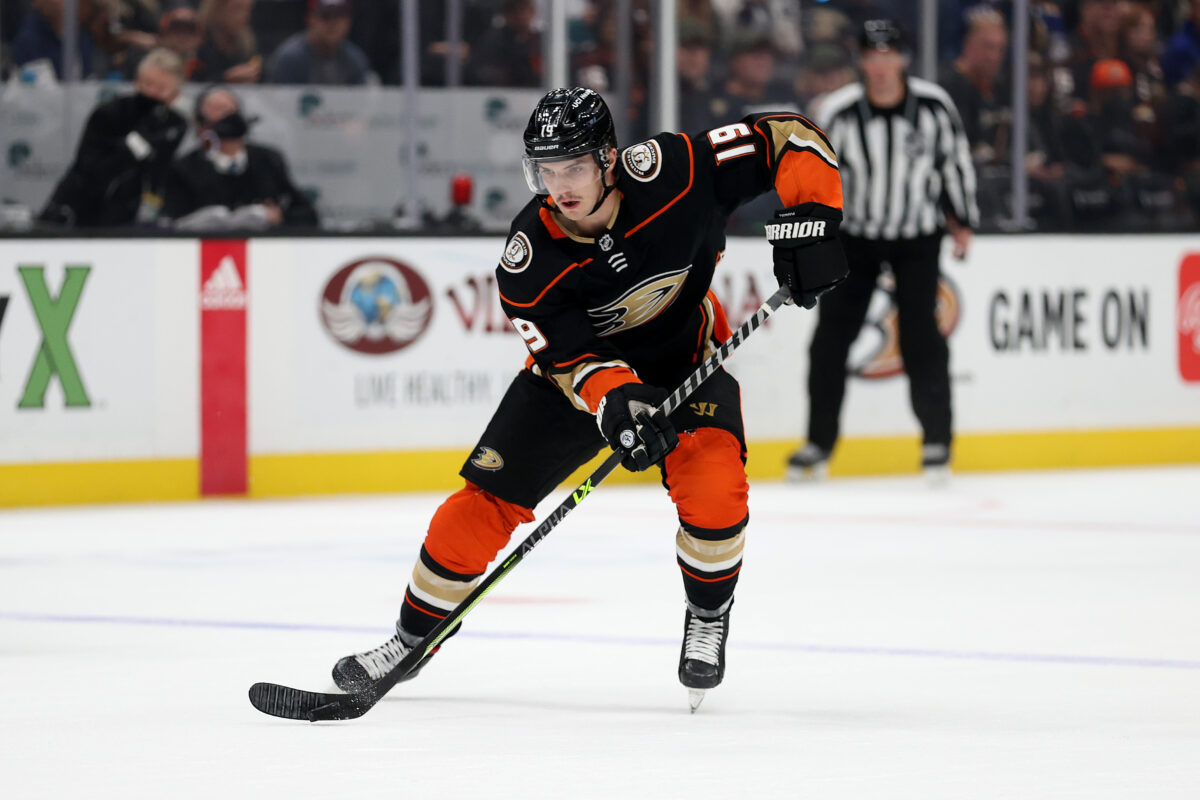Scoring 50 goals in a single NHL season is a tough thing to do. Accomplishing the feat is a confluence of many factors, including but not limited to the player’s individual skillset, the players around him, volume of opportunities, and, of course, a little bit of puck luck. The Anaheim Ducks have gone over 10 years without one, but with all the talent they’ve accumulated during their current rebuild, one best believe that their next member of the 50-goal club is waiting in the wings.
A Brief History of Their Previous 50-Goal Scorers
The Ducks have had three players score 50 or more goals in their 29 seasons as an NHL franchise. Paul Kariya did it first when he scored 50 in 1995-96. Teemu Selanne scored 51 and 52 in back-to-back seasons from 1996-1998, and Corey Perry scored 50 in 2010-11. Each player was special in their own ways and possessed qualities that made them a scoring threat whenever they were on the ice, whether they had the puck or not.
For Selanne and Kariya, speed, chemistry, positioning, and shooting ability elevated them to elite goal-scoring status. Both of them knew where to be and how to get to scoring areas both with and away from the puck, a critical skill for all players, not just goal-scorers. Both of Selanne’s 50-goal years in Anaheim were spent on a line with Kariya, and their knack for finding each other was as obvious as it was mesmerizing.
For Perry, it was his size, strength, positioning, soft touch in tight spaces, and willingness to pay the price to get in scoring position that made him great. He was fearless in his pursuit to get into areas where he could scoop up rebounds, get his stick on pucks, and be a menace to opposing defenders and goaltenders. It was beautiful to watch, but in a different way than Selanne and Kariya. There’s no cookie-cutter mold to elite goal-scoring.
The Ducks have a few players on the roster or in the system that are cut from similar cloths as these names, and have the potential to be the next 50-goal scorer. Let’s explore who it could be.
The Next Wave of Candidates
Most Likely: Troy Terry

How He Can Get There: We’ve discussed Terry’s strengths as an offensive force ad nauseum, but it’s precisely those skills that make him the prime candidate to get 50 someday. He attacks the net often, he’s unafraid to shoot, and utilizes a great blend of speed, creativity, and patience to beat goaltenders. It’s a recipe for high-volume scoring.
Alternate Possibility: Mason McTavish
How He Can Get There: I mentioned earlier this week that the Ducks had a nice thing going with feeding McTavish one-time opportunities on the power play last season. So much so that it appears to be a legitimate option for their man-advantage tactics going forward. With the elite passing and vision of his linemates, McTavish could be fed pucks for years to come and see countless opportunities to put the puck in the net. Like Perry, he is strong, good in tight spaces, and understands where he needs to be on the ice to find scoring opportunities. It’s a slightly different pathway to scoring from Terry’s, but a pathway to high-volume scoring nonetheless.
Dark Horse Candidate and Honorable Mention
Despite this talk about who could be next to score 50, the reality is that the Ducks, as currently constructed, remain painfully short of players with dynamic goal scoring ability and/or potential. Offense is a significant concern. Which is why we must hope there is someone in the system that can eventually join Terry, Zegras, McTavish, and shiny new draft pick Leo Carlsson (who will be expected to do great things) upfront and contribute in a major way. Sasha Pastujov is a name to keep an eye on. It’s never great to to fully rely on performance in junior as a predictor of success at the pro level, but in the absence of any NHL action so far, his praise as a pure goal-scorer in his junior career is a label is worth noting. Thus, for now, he’s a dark horse, at best. Time will tell.
Prediction: Terry Gets It Done Within 4 Seasons
The roster undoubtedly will experience an influx of talent over the next few seasons that will require time, experience, and patience to gel. Terry will be leading the way, as he has the past two seasons, but once the rest of the offense catches up, the Ducks’ top six offers a unique and explosive potential. Expect Terry, who just re-upped in Anaheim for seven more years, to crack 50 by the end of the 2026-27 season. He’s the obvious choice, and as of now, the most capable out of anyone on the roster.
